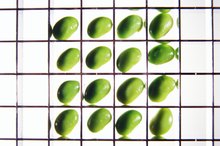Soy Isoflavones Side Effects
Isoflavones are compounds derived from plants that have estrogen-like properties, according to doctors at the Linus Pauling Institute Micronutrient Information Center. The richest source of isoflavones comes from soybeans and soy products. Although adding soy to a nutritional plan has a number of benefits, soy isoflavones carry some risks of side effects.
Breast Cancer
Although studies sometimes are conflicting, researchers at the Linus Pauling Institute say soy isoflavones can increase the production of estrogen receptor breast cancer cells. High intakes of the compound can interfere with the effectiveness of some cancer treatments, such as tamoxifin. As research continues, women with breast cancer are advised to stick with moderate dietary consumption of soy and limit excessive supplementation.
Thyroid Disorders
Benefits of Soy Protein for Breast Growth
Learn More
Researchers at the Weston A. Price Foundation say soy isoflavones have a direct correlation with increased thyroid disease. Soy isoflavones can cause goiter and hypothyroidism by interfering with thyroid hormone synthesis. Thyroid dysfunction typically can be avoided as long as sufficient levels of iodine are added to the product, which is a protocol followed by most commercial producers of soy products. Even with sufficient levels of iodine, however, high doses of soy supplements can lead to thyroid cancer as well.
- Researchers at the Weston A.
- Price Foundation say soy isoflavones have a direct correlation with increased thyroid disease.
- Even with sufficient levels of iodine, however, high doses of soy supplements can lead to thyroid cancer as well.
Digestive Disorders
Soy isoflavones can trigger food allergies in some people, with side effects including itching, a runny nose, stomach irritations and digestive disorders. Doctors at the Mayo Clinic say soy supplements have been associated with bloating, cramping and other stomach problems. Intestinal side effects vary and can cause infants to have serious diarrhea when fed soy-based formula. Constipation and changes in stool quality also can be side effects of soy isoflavones.
- Soy isoflavones can trigger food allergies in some people, with side effects including itching, a runny nose, stomach irritations and digestive disorders.
- Constipation and changes in stool quality also can be side effects of soy isoflavones.
Headaches
Soy and Hormonal Imbalance
Learn More
Products made with soy isoflavones can cause migraine headaches in some people, the Mayo Clinic says. People with allergic reactions can have low-grade headaches as a result of increased heart rate or heart palpitations.
Unknown Factors
Doctors at Penn State University say too little research is available on the ultimate consequences of taking high levels of soy isoflavone supplements. Although soy isoflavones that occur naturally in soybeans, tofu and tempeh generally are considered safe for healthy adults, supplements can pose additional unknown dangers. Soy powders and pills often contain levels of isoflavones that do not fall within safe parameters. To prevent thyroid or cancer-causing side effects, consumers should limit soy consumption to 100 milligrams or less per day.
- Doctors at Penn State University say too little research is available on the ultimate consequences of taking high levels of soy isoflavone supplements.
- Although soy isoflavones that occur naturally in soybeans, tofu and tempeh generally are considered safe for healthy adults, supplements can pose additional unknown dangers.
Related Articles
References
- Linus Pauling Institute Micronutrient Information Center: Soy Isoflavones
- Weston A. Price Foundation: Soy Isoflavones
- Ahsan M, Khurram Mallick AK. The Effect of Soy Isoflavones on the Menopause Rating Scale Scoring in Perimenopausal and Postmenopausal Women: A Pilot Study. J Clin Diagn Res. 2017 Sep;11(9):FC13–FC16. doi:10.7860/JCDR/2017/26034.10654
- Mason, P. Isoflavones. The Pharmaceutical Journal. 2001;266(7129):16-19.
- Yu J, Bi X, Yu B, Chen D. Isoflavones: Anti-Inflammatory Benefit and Possible Caveats. Nutrients. 2016;8(6):361. doi:10.3390/nu8060361
- Rietjens IMCM, Louisse J, Beekmann K. The potential health effects of dietary phytoestrogens. Br J Pharmacol. 2017 Jun;174(11):1263-1280. doi:10.1111/bph.13622
- Franco OH, Chowdhury R, Troup J, et al. Use of Plant-Based Therapies and Menopausal Symptoms: A Systematic Review and Meta-analysis. JAMA. 2016;315(23):2554-2563. doi:10.1001/jama.2016.8012
- Herbs and Phytoestrogens. National Women’s Health Network. Published 2015.
- Soy. Drugs.com. Updated January 9, 2018.
- Esch H, Lehmann L. Learn More About Isoflavones. Science Direct. Published 2016.
- Franco OH, Chowdhury R, Troup J, et al. Use of Plant-Based Therapies and Menopausal Symptoms: A Systematic Review and Meta-analysis. JAMA. 2016;315(23):2554-2563. doi:10.1001/jama.2016.8012
- Gardner C, Chatterjee L, Franke A. Effects of isoflavone supplements vs. soy foods on blood concentrations of genistein and daidzein in adults. The Journal of Nutritional Biochemistry. 2009 Mar; 20(3): 227–234. doi:10.1016/j.jnutbio.2008.02.008
- Mason P. Isoflavones. The Pharmaceutical Journal. 2001;266(7129):16-19.
- Rietjens IMCM, Louisse J, Beekmann K. The potential health effects of dietary phytoestrogens. Br J Pharmacol. 2017 Jun;174(11):1263-1280. doi:10.1111/bph.13622
- Vincent A, Fitzpatrick LA. Soy Isoflavones are they useful in menopause? Mayo Clinic Proceedings. 2000;(11):1174-84.
- Yu J, Bi X, Yu B, Chen D. Isoflavones: Anti-Inflammatory Benefit and Possible Caveats. Nutrients. 2016;8(6):361. doi:10.3390/nu8060361
- Zhang F, Haslam D, Terry M, et al. Dietary isoflavone intake and all-cause mortality in breast cancer survivors: The Breast Cancer Family Registry. Wiley Online Library. 2017. doi:10.1002/cncr.30615
Writer Bio
Linda Ray is an award-winning journalist with more than 20 years reporting experience. She's covered business for newspapers and magazines, including the "Greenville News," "Success Magazine" and "American City Business Journals." Ray holds a journalism degree and teaches writing, career development and an FDIC course called "Money Smart."









